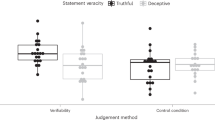Abstract
The Criteria-Based Content Analysis (CBCA) technique has been proposed as a way to differentiate truth from falsehood in interviews of children. We studied adults, utilizing 14 of the 19 CBCA criteria. In a 2×2 design, 114 students estimated the truthfulness of the statements of 12 adults; 6 were true and 6 described an invented traumatic personal experience. Subjects viewed a videotape or read a written transcript; half were trained in CBCA and half were not. Trained subjects who saw videotapes performed significantly better than chance and were significantly more accurate than each of the other 3 groups. For the trained subjects, 10 of the 14 CBCA criteria yielded significant differences in the predicted direction between evaluations of truthful and invented statements.
Similar content being viewed by others
References
Bulkley, J. A. (1989). The impact of new child witness research on sexual abuse prosecutions. In S. J. Ceci, D. F. Ross, & M. P. Toglia (Eds.),Perspectives on children's testimony (pp. 208–229). New York: Springer-Verlag.
Ceci, S. J., Ross, D. F., & Toglia, M. P. (1987). Age differences in suggestibility: Narrowing the uncertainties. In S. J. Ceci, M. P. Toglia, & D. F. Ross, Eds.,Children's eyewitness memory (pp. 79–91). New York: Springer-Verlag.
Conerly, S. (1986). Assessment of suspected child sexual abuse. In K. MacFarlane, J. Waterman, S. Conerly, L. Damon, M. Durfee, & S. Long (Eds.),Sexual abuse of young children: Evaluation and treatment (pp. 30–51). New York: Guilford.
DePaulo, B. M., & Pfeifer, R. L. (1986). On-the-job experience and skill in detecting deception.Journal of Applied Social Psychology, 16, 249–267.
DePaulo, B. M., Stone, J. L., & Lassiter, G. D. (1985). Deceiving and detecting deceit. In B. R. Schlenker (Ed.),The self and social life (pp. 323–370). New York: McGraw-Hill.
Ekman, P., & O'Sullivan, M. (1991). Who can catch a liar?American Psychologist, 46, 913–920.
Esplin, P. W., Houed, T., & Raskin, D. C. (1988, June).Applications of statement validity assessment. Paper presented at the NATO-Advanced Study Institute on Credibility Assessment, Maratea, Italy.
Faller, K. C. (1984). Is the child victim of sexual abuse telling the truth?Child Abuse and Neglect, 8, 471–481.
Goodman, G. S., & Clarke-Stewart, A. (1991). Suggestibility in children's testimony: Implications for sexual abuse investigations. In J. Doris (Ed.),The suggestivity of children's recollections (pp. 92–105). Washington, DC: APA.
Jones, D. P. M., & McGraw, J. M. (1987). Reliable and fictitious accounts of sexual abuse in children.Journal of Interpersonal Violence, 2, 27–45.
King, M. A., & Yuille, J. C. (1987). Suggestibility and the child witness. In S. J. Ceci, M. P. Toglia, & D. F. Ross (Eds.),Children's eyewitness memory (pp. 24–35). New York: Springer-Verlag.
Koehnken, G. (1987). Training police officers to detec deception: Does it work?Social Behaviour, 2, 1–17.
Koehnken, G. (1989).The evaluation of statement credibility: Social judgement and expert diagnostic approaches. Paper presented at the International Conference on Children's Eyewitness Evidence in Legal Proceedings, Selwyn College, Cambridge, England.
Kraut, R. E., & Poe, D. (1980). On the line: The deception judgements of customs inspectors and laymen.Journal of Personality and Social Psychology, 39, 784–798.
Langer, E. J., & Abelson, R. P. (1972). The semantics of asking a favor: How to succeed in getting help without really dying.Journal of Personality and Social Psychology, 24, 26–32.
Raskin, D. C., & Esplin, P. W. (1991). Assessment of children's statements of sexual abuse. In J. Doris (Ed.),The suggestibility of children's recollections (pp. 153–164). Washington, DC: American Psychological Association.
Raskin, D. C., & Yuille, J. C. (1989). Problems in evaluating interviews of children in sexual abuse cases. In S. J. Ceci, D. F. Ross, & M. P. Toglia (Eds.),Perspectives on children's testimony (pp. 184–207). New York: Springer-Verlag.
Steller, M. (1989). Recent developments in statement analysis. In J. C. Yuille (Ed.),Credibility sessment (pp. 135–154). Norwell, MA: Kluwer.
Steller, M., & Koehnken, G. (1989). Criteria-based statement analysis. In D. C. Raskin (Ed.),Psychological methods in clinical investigation and evidence (pp. 217–245). New York: Springer.
Steller, M., Raskin, D. C., Esplin, P. W., & Boychuk, T. (1989).Child sexual abuse: Forensic interviews and assessment techniques. Unpublished manuscript.
Steller, M., Wellershaus, P., & Wolf, T. (1988).Empirical validation of criteria-based content analysis. Paper presented at the NATO Advanced Study Institute on Credibility Assessment, Maratea, Italy.
Turtle, J. W., & Wells, G. L. (1987). Setting the stage for psychological research on the child eyewitness. In S. J. Ceci, M. P. Toglia, & D. F. Ross (Eds.),Children's eyewitness memory (pp. 230–248). New York: Springer-Verlag.
Yuille, J. C. (1988). The systematic assessment of children's testimony.Canadian Psychology, 29, 247–262.
Wells, G. L., & Loftus, E. F. (1991). Commentary: Is this child fabricating? Reactions to a new assessment technique. In J. Doris (Ed.),The suggestivity of children's recollections (pp. 168–171). Washington, DC: APA.
Zuckerman, M., DePaulo, B. M., & Rosenthal, R. (1981). Verbal and nonverbal communication of deception. In L. Berkowitz (Ed.),Advances in experimental social psychology (Vol. 14, pp. 1–59). New York: Academic Press.
Author information
Authors and Affiliations
Additional information
Kristine Landry is now at Clark University.
About this article
Cite this article
Landry, K.L., Brigham, J.C. The effect of training in Criteria-Based Content Analysis on the ability to detect deception in adults. Law Hum Behav 16, 663–676 (1992). https://doi.org/10.1007/BF01884022
Issue Date:
DOI: https://doi.org/10.1007/BF01884022




